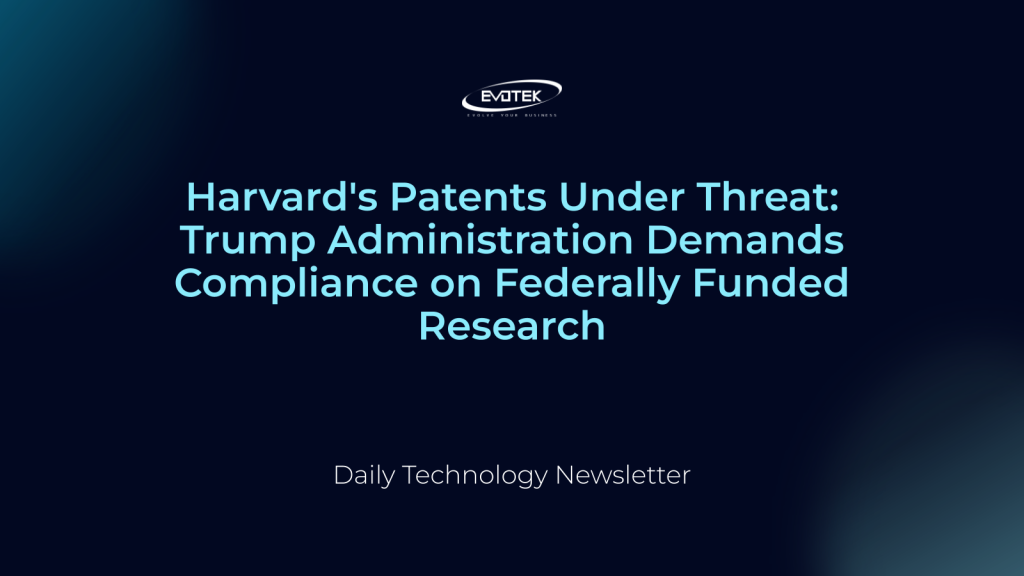The Trump administration has intensified its ongoing conflict with Harvard University, signaling a significant escalation by threatening to seize control of the Ivy League institution’s patents derived from federally funded research. This latest development marks a critical turn in the months-long dispute between the government and the prestigious university.
The Core of the Patent Dispute
In a direct communication to Harvard President Alan Garber, Commerce Secretary Howard Lutnick announced an “immediate comprehensive review” into whether the university has adhered to federal regulations concerning patents. The patents at the center of this controversy are estimated to be worth hundreds of millions of dollars.
Secretary Lutnick’s letter explicitly warned that the Commerce Department could grant third-party licenses for Harvard’s patents or even assume full ownership if the university is found to be non-compliant with government requirements related to patent titles and disclosures. Harvard has been ordered to furnish detailed information on all patents secured through federal funding, including their current applications, licensing agreements, mandates for “substantial U.S. manufacturing,” and licensee identities.
“We believe that Harvard has failed to live up to its obligations to the American taxpayer and is in breach of the statutory, regulatory, and contractual requirements tied to Harvard’s federally funded research programs and intellectual property arising therefrom,” Lutnick stated. The university has until September 5 to respond and demonstrate its compliance with the Bayh-Dole Act, legislation mandating that universities receiving federal research grants ensure that resulting inventions benefit Americans.
Harvard’s Defense and Broader Conflict
A spokesperson for Harvard University swiftly condemned the administration’s move, characterizing it as “yet another retaliatory effort targeting Harvard for defending its rights and freedom.” The university emphasized the societal impact of its research, stating, “Technologies and patents developed at Harvard are life-saving and industry-redefining. We are fully committed to complying with the Bayh-Dole Act and ensuring that the public is able to access and benefit from the many innovations that arise out of federally funded research at Harvard.”
A History of Tensions
This patent dispute is the latest chapter in a protracted and escalating feud. The Trump administration previously halted or cut billions in federal research funding to Harvard, citing the university’s alleged failure to adequately address campus antisemitism. In response, Harvard initiated legal action, contending that the government’s actions constituted an illegal punishment for First Amendment-protected activities and an attempt to exert undue control over its academic programs.
Prior to the funding freezes, the administration had demanded that Harvard implement specific changes—including an external audit of certain academic departments, the discontinuation of DEI (Diversity, Equity, and Inclusion) programs, and stricter disciplinary policies—as conditions for maintaining its financial relationship with the federal government. Harvard reportedly rejected these demands.
The administration’s pressure campaigns against Harvard have extended beyond research funding. President Trump has urged the Internal Revenue Service to review Harvard’s tax-exempt status and directed his administration to prohibit most foreign students from studying at the university, though a judge ultimately blocked this particular directive.
Understanding the Bayh-Dole Act and Future Implications
The Bayh-Dole Act of 1980 is crucial to this dispute. It grants universities, small businesses, and non-profits intellectual property rights to inventions arising from federally funded research, with the understanding that these inventions will be commercialized and benefit the U.S. public. The Act includes “march-in rights,” allowing the government to take control of patents or grant licenses to others under specific circumstances, such as non-utilization or failure to meet public needs.
While Harvard maintains its commitment to compliance, the administration’s aggressive posture suggests a heightened scrutiny of how universities leverage taxpayer-funded innovations. Notably, some other Ivy League institutions that faced similar funding freezes have reached agreements with the administration, with universities like Columbia and Brown making various concessions to the federal government. The outcome of Harvard’s stand could set a significant precedent for academic freedom, federal research funding, and intellectual property rights across the nation’s higher education landscape.

 日本語
日本語 한국어
한국어 Tiếng Việt
Tiếng Việt 简体中文
简体中文